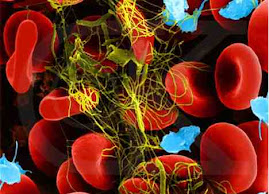Living With Deep Vein Thrombosis
If you've had a deep vein blood clot, you're at greater risk for another one. During treatment and after, it's important to:
Take steps to prevent deep vein thrombosis (DVT). (Search For More information on Google under "How Can Deep Vein Thrombosis Be Prevented?")
Follow these tips:
Check your legs for signs and symptoms of DVT. These include swollen areas, pain or tenderness, increased warmth in swollen or painful areas, or red or discolored skin on the legs.
Contact your doctor right away if you have signs and symptoms of DVT.
Ongoing Health Care Needs
Medicines that thin your blood and prevent blood clots are used to treat DVT. These medicines can thin your blood too much and cause bleeding (sometimes inside the body). This side effect can be life threatening.
Bleeding may occur in the digestive system or the brain. Signs and symptoms of bleeding in the digestive system include:
Bright red vomit or vomit that looks like coffee grounds
Bright red blood in your stools or black, tarry stools
Pain in your abdomen
Signs and symptoms of bleeding in the brain include:
Severe pain in your head
Sudden changes in your vision
Sudden loss of movement in your arms or legs
Memory loss or confusion
If you have any of these signs or symptoms, get treatment right away.
You also should seek treatment right away if you have a lot of bleeding after a fall or injury. This could be a sign that your DVT medicines have thinned your blood too much.
Talk to your doctor before taking any medicines other than your DVT medicines. This includes over-the-counter medicines. Aspirin, for example, also can thin your blood. Taking two medicines that thin your blood may raise your risk for bleeding.
Ask your doctor about how your diet affects these medicines. Foods that contain vitamin K can change how warfarin (a blood-thinning medicine used to treat DVT) works. Vitamin K is found in green, leafy vegetables and some oils, like canola and soybean oil. Your doctor can help you plan a balanced and healthy diet.
Discuss with your doctor whether drinking alcohol will interfere with your medicines. Your doctor can tell you what amount of alcohol is safe for you.
Monday, March 17, 2008
Living With Deep Vein Thrombosis
Labels: Living With Deep Vein Thrombosis
